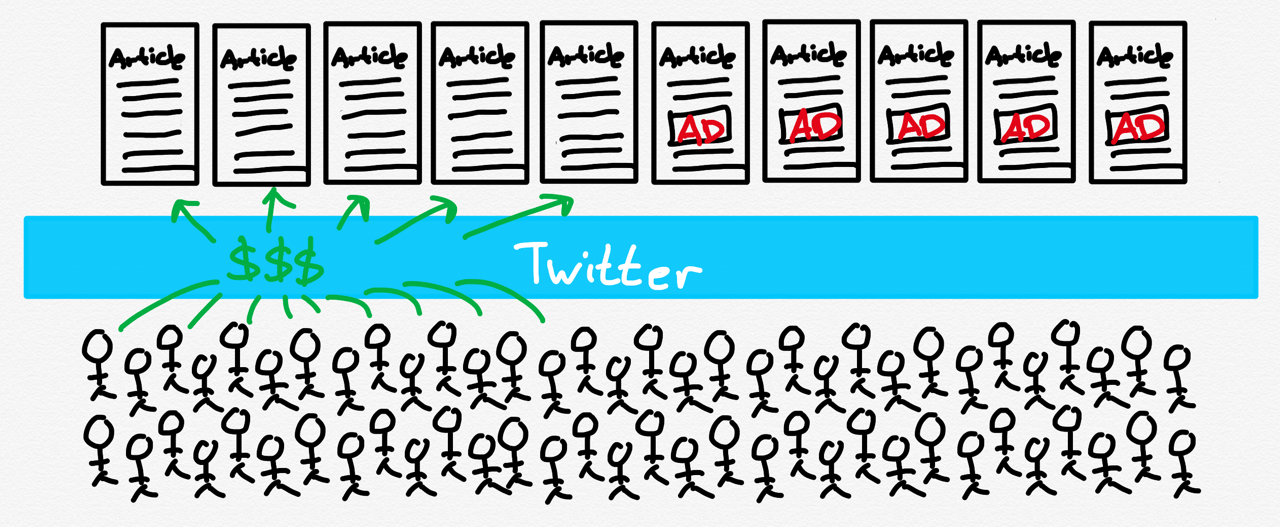#1 Jack's Weekly Digest - Photons, Clouds and Alien Languages
Your weekly brain food made by a Gen-Z generalist on tech strategy, crypto, deeptech and futurism. Every Sunday, you receive 10 Reads of the Week with my analyses and suggestions for further readings. I try my best to make you laugh with my Jokes of the Week.

Welcome to the first issue of Jack's Weekly Digest newsletter.
Some of us are addicted to caffeine. Some are addicted to TikTok. I am addicted to consuming content on Substack (I have 100+ newsletter subscriptions).
I am a power consumer of written content. And I am also a power sharer of content. Over the past few months, I have sent articles to many of my friends and have simply lost track of the interesting interactions I have had.
Perhaps it's time for me to be a content producer. Rather than sending each of my friends an article individually, I am going to compile a list of interesting reads over the week.
Think of this newsletter as your weekly brain food made by a Gen-Z nerd 🙋🏻♂️
The structure of this newsletter is as follows:
- Weekly issue delivered to your mailbox every Sunday
- 10 Reads of the Week
- My analyses and suggestions for further readings
- Jokes of the Week
- (if any) Links to my new blog posts
I update my blog infrequently.
I write about quirky science, trendy thoughts and hidden connections.
Some examples of my drafts:
- The under-lit segment of anti-Enlightenment history
- Shorting startups in the 2021 bull market
- Why I, as a Chinese, learnt Arabic in Jordan
- Silicon Valley's intellectual obsession with German philosophers
- Programmable biology: the rise of bio-hackers
- Many more....in fact... 90 other drafts more!
Do you find these interesting? Sign up here to subscribe. You will also receive a weekly update of this newsletter alongside occasional blog updates.
It's my first time trying out this newsletter format. We all start somewhere. And we all start with failures.

Except SpaceX Starship's failures are far more spectacular than mine. So, who really cares about me?
10 Reads of the Week
1. Jeff Bezos and his lawful evil energy
This is an untold story of how Jeff Bezos beat the tabloids by defusing the 'photos below the belt'-bomb himself. It is a part of the new book, Amazon Unbound. I recently got my College Library to buy it. I can't wait to read the lawful evil energy of Bezos!

Analysis
This is an extremely interesting read. When you are rich and powerful, power brokers will come to you and come against you.
In the Medieval times, we have Kings and their Curla Regis – King's Court – brokering and dealing with matters the Kings could not be seen being involved with. In the 21st century, we have super-billionaires and the tabloids & brokers (a job that never gets replaced by technology) who do the dirty jobs for the uber-rich.
Does this remind you of the Conspiracy, the book about Peter Thiel, Hulk Hogan and Gawker?
2. Silicon or Photonics?
There's a lot of media coverage on chip shortage. Some attribute the sudden surge in demand to smartphone makers, IoT and needs of AI computing. On the other hand, the supply chain has not caught up because 1) scaling chip-making manufacturing capacity is hard 2) geo-political and supply-chain overcentration risk with most of chips being made in Taiwan.
A potential out-of-the-box solution is to critically assess if silicon-based semiconductor chips are really what we need.

Analysis
Lightmatter is certainly an interesting startup to watch. I speculate that much of their design and manufacturing know-how can also be transferred to quantum computing chips too.
But well, no one knows who will win the QC race... photonics? superconductors? ionics?
3. Super-conductors in chips
Speaking of chips, it turns out super-conducting micro-processors make things faster, as per the IEEE article below. Wow! We must have just discovered how overclocking works!
Another solution to high energy consumption of chips is reversible computing.
Is it possible? What are the implications? Also check out my article on Medium that discusses a slightly different topic but nevertheless touches upon reversible computing, rather counter-intuitively: Can life survive till the end of universe?
4. New academic disciplines emerge out of bubbles
Crypto-economics is a fascinating field to watch. Intellectually, it is an intersection of mechanism design (economics), cryptography (computer science), and community-building (startup growth hacks and sociology). Structurally, it is one of the rarest fields where the academia has caught up with some of the leading thinkers and trends in industry.
Cryptoeconomic Systems is a new journal coming out of MIT. It seems like MIT is ahead of the game! They also have a crypto-economics research lab here.
Analysis
Europe has already lost the Web 1.0 and Web 2.0 leadership positions to the US. Is Europe going to lose the Web 3.0 to the US as well?
5. Waiving COVID vaccines' IP
Waiving IP right to the COVID vaccines – an example of Coase's theorem in action. What if everyone in the world can pay off the vaccine sellers in order to prevent the costs associated with covid? This certainly is a more Pareto-optimal solution compared to just blanket open-sourcing vaccines.
If the Biden administration waived IPs in order to reduce supply constraints, Derek Lowe wrote that this would be the wrong policy. The most significant supply constraints are non-IP. As with most blogs, always read the comments. They are the funniest and sometimes (albeit very rarely) insightful too.
Tyler Cowen, an economist very well-known in the blogging and Valley circle, also wrote a short response to Biden's policy. Similar to Lowe, he thought that non-IP supply constraints are the most significnat obstacles to mass vaccination.
6. We will all live among the clouds
Everything is on the cloud. Your data is on the cloud. And now, Mighty wants to move your whole computer to the cloud too, with its cloud-based browser designed to supplement (more like replace!) Chrome.
1/ Today we're unveiling Mighty: a faster browser that is entirely streamed from a powerful computer in the cloud.
— Suhail (@Suhail) April 27, 2021
Demo in the next tweet 👇
New website: https://t.co/RTuSGLciUz
There was quite a hype on Twitter around it. It certain helps with Paul Graham tweeting and said that 'if you want to make a lot of money in the future, join @mightyapp'.
The Twitter thread above is really a good read about the reception of this $30-month product.
Analysis
I had three immediate thoughts when I read about it:
Product
The natural comparable to Mighty is Chrome. Mighty runs on the cloud while Chrome runs on the client (user's own computer). In general, running cloud-based browser helps with performance only if:
rate of improvements in internet latency < rate of improvement of local computing power and energy consumption (Moore's Law)
Most use-cases that do not demand running several GPUs at server, it probably makes more sense to get a powerful laptop than to run browsers on cloud.
Another interesting point is that Mighty is betting on how browsers will replace Operating Systems. An upper layer of abstraction beating the bottom layer.
Business
The unit economics is fascinating. Assume that performance on-cloud is similar to on-prem performance, consumers definitely prefer variable costs to fixed costs.
There are many users who fit the proflie of an occasional power user of Photoshop, Figma and other heavy graphic-rendering web-based apps. The entire bracket of digital nomad fits this catagory.
Pay more when you use more. This is a much more appealing alternative compared to getting a $5,000 laptop only to fully use its power several times a week.
Privacy
A lot of Twitter users voiced this concern. As the data runs through Mighty's server, the risk of single point-of-failure is high. But then again, as Suhail rightly pointed out, isn't Chrome also a single point-of-failure?
7. Internet market-makers and where to find them
Ben Thompson from the Stratechery wrote another thought-provoking piece. One of the powers of aggregators is to be a market-maker but no one has really done that. Ben Thompson thinks that Twitter is on its way to be one, with its acquisition of Scrolls.

Analysis
In finance, market-makers increase liquidity and take risks by holding opposite positions. Ben Thompson's usage of the term seems to suggest another aspect of market-making: aggregator of individual demand, distribution of product, and price discrimination via monetisation.
I am aware that my thoughts on this matter are not elucidated enough yet. Feel free to contact me and chat more.
P.S. I would love to pay for Stratechery's premium subscription. However, as a student, I cannot really afford $12/month (on top of other subscriptions I am paying). So if you like my Weekly Digest and blog articles, please consider becoming a paying subscriber!
8. Time inversion is possible – B2B payment lives in the 2000s
B2C and P2P fintech have grown very innovative for the past years. B2B fintech, however, is still living in the 2000s. 64% of B2B payments in the US is still done via checks. Yes, you read that right. A piece of paper check.

And so Y-Combinator hit us with another transparent piece about Brex's strategy. This is a really good piece about Brex's roadmap, rationale behind its entry market position (an arguably post-hoc justification), and the dynamics of Brex with other fintech infrastructure providers i.e. Stripe and bill.com etc.

Analysis
I have been following Brex since 2018. It caught my attention because its marketing felt like a neo-bank for startups. Their founders (Stanford) also used to run college consulting businesses back in Brazil and had quite a success.
Needless to say, I think they are my powerful role-models of how young people (David) can reasonably and potentially challenge a massive and sluggish financial market (Goalith).
Other role models include the Collinsons of Stripe. Duh.
9. What does the alien say? Quack Quack Quack...
I am a space nerd. Well, I am a nerd into pretty much everything. And so Isaac Arthur's recent video on Alien Languages hits all the right spots for my intellectual interests: philosophy, comparative linguistics and futurism.
Will aliens share some similar concepts as we do? Isaac Arthur thought so. He thought death and territory are two concepts that all intelligent beings should experience. Hence, there should be communications that convey the meanings of the two concepts.
Analysis
When we start to think about non-human beings, it is important not to commit anthropocentrism. For example, it is possible that non-organic lifeforms (e.g. Tranformers) might not even develop some of the 'essential' features of language Isaac Arthur has theorized.
But Michael Bay made the Transformers speak English. How disappointing!
One of the catalysts that can help us understand xenolinguistics is to understand the languages of animals on Earth first. Scientists have been able to draw correlations between behaviour and honey bees' mating dances. Some research is now being done on whales' signals.
Eventually we might find out that our languages are not so 'intelligent' compared to the dolphins.
10. (Again) How China is different from the West
Chinese consumer tech is known for:
- blitzscaling at the expense of the VCs
- a Colosseum for Baidu, Alibaba and Tencent
- super-apps everywhere.
Yang Zhong as a UX designer answers rather nicely to third point. Why are there so many super-apps? As a user myself, I am often overwhelmed by the amount of information presented on Chinese apps. Yang Zhong seems to think that this is deliberate and is the result of divergent culture and internet infrastructure.

Joke of the week
Sharing economy in a first-world country: swimming pools

Swimply, a startup that allows underutilized swimming pool owners to monetize them, raised a $10M Series A round. Norwest Venture Partners, Trust Ventures, and angel investors such as Manish Chandra, Rob Chesnut, Deborah Liu, and Michael Curtis financed the round.
Good for you, Swimply! Such late-stage capitalism. Will we get to the sharing economy for helicopter landing pads? Super-yachts (Bezos-scale) ?
That's it for this week. Hope you enjoyed reading.
Like this? Sign up here
I am going to leave you with a soothing free-diving video.
Have a great weekend!




